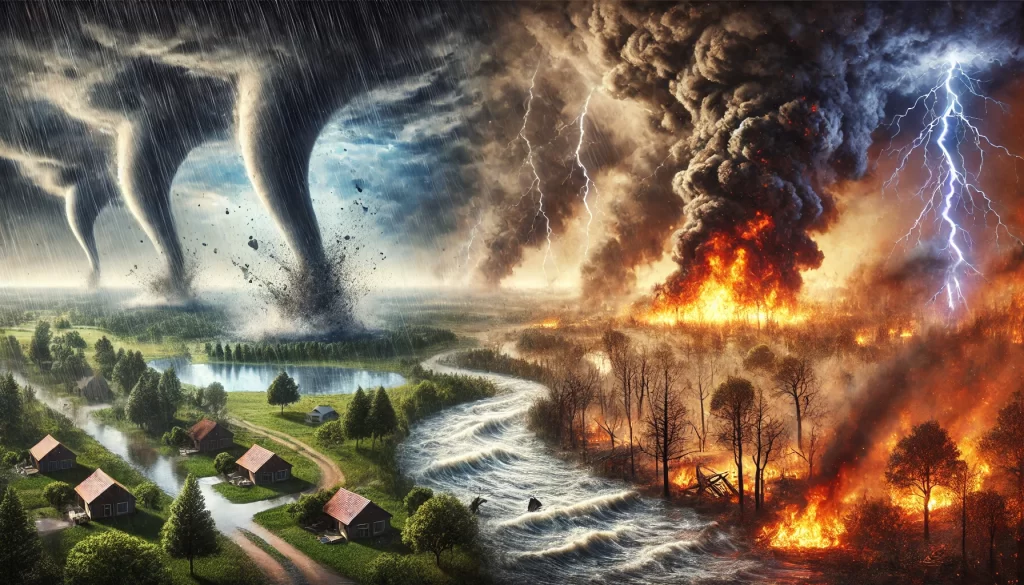
It Affects Us All
Climate change, one of the most critical challenges facing humanity in the 21st century, seems to be forgotten in all the controversy surrounding DOGE. Regardless of everything else going on, we can’t ignore climate change because it affects global temperatures, weather patterns, ecosystems, and economies. The overwhelming scientific consensus is that human activities—primarily the burning of fossil fuels—are driving climate change.
The existence of climate change and the impact of human activity, like any other field of science, includes areas of disagreement among researchers. One of the principal areas of disagreement is about the sensitivity of the climate to the increase in CO2 production and the rate at which global warming will occur. There’s also discussion about how effective climate models may be with some arguing that the models may either overestimate or underestimate certain effects. A significant area of disagreement is over what is known as the “tipping points”. This is a debate about when or if certain events such as ice sheet collapse, permafrost thaw or ocean circulation changes might occur. Some argue these events could trigger rapid self-reinforcing climate shifts while others believe changes will be more gradual. Even with this disagreement there is broad acceptance that climate change has increased the frequency and intensity of heat waves, heavy rain and extreme weather.
As intense as some of these scientific debates maybe, they pale in significance beside the political debates being generated around climate change.
When the possibility of climate change was first recognized in the 1970s and 1980s there was bipartisan support to address possible remediation of long-term impacts. Republican President Richard Nixon signed landmark environmental laws including the Clean Air Act.
During the 1990s climate change became more polarized. President George H. W. Bush begin to frame climate change policy as an economic threat. George W. Bush rejected the Kyoto Protocol to avoid “economic hindrance”.
By 2008 the partisan divide had significantly increased. Republicans increasingly dismissed climate risks while Democrats amplified the urgency of taking action. By 2023, 78% of Democrats prioritized climate policy, but only 21% of Republicans viewed climate action as urgent despite increasing climate risks in some GOP dominated states such as Florida and Texas.
The partisan gap expanded as conservative science skeptics continued to raise issues about rates of change, economic impacts and potential solutions. These conservatives tend to view climate policies as government overreach, while progressives hold the position that the government led initiatives are essential to combat environmental threats.
As they have in many other issues, the media have lined up into conservative and progressive camps. The conservative leaning media downplays climate risks while the liberal leaning media emphasizes the danger and need for urgent action. As with many other things this leads to a “echo chamber” effect simply reinforcing political beliefs without adding anything new of significance to the debate.
The Trump administration has signaled its desire to undo many of the climate change initiatives put in place by Democratic administrations. On January 20, 2025, President Trump signed Executive Order 14162 directing the immediate withdrawal of the United States from the Paris Climate Agreements and related international climate commitments. He has declared a “National Energy Emergency” to accelerate fossil fuel development and ease restrictions on the construction of new oil and gas projects. As part of this effort, he has weakened environmental reviews. This is expected to significantly increase fossil fuel consumption and associated greenhouse gas emissions. The Trump administration has begun the rollback of environmental regulations. Lobbyists for the oil, gas and chemical industries have been appointed to the Environmental Protection Agency to reverse climate regulations and pollution controls.
The administration is withdrawing funding for clean energy initiatives including those aimed at reducing carbon emissions and promoting renewable energy resources. The administration has initiated a review of the “legality and continued applicability” of the EPA’s endangerment finding which is the basis of most federal regulations on greenhouse gas. The administration rolled back regulations limiting methane emissions from oil and gas operations. The definition of “waters of the United States” under the Clean Water Act was narrowed, potentially allowing increased pollution in streams and wetlands.
We can expect increases in severe weather because of Trump’s environmental policies. These policy decisions collectively hinder efforts to mitigate climate change, potentially leading to increased greenhouse emissions and global warming. Reduction in funding for climate change research and the rollback of environmental regulations will have long term adverse effects on both domestic and global environmental health.
Significant budget cuts and layoffs within agencies like the National Oceanic and Atmospheric Administration (NOAA) could impair the ability to forecast and respond to severe weather events. For instance, the reduction of meteorologists and environmental scientists may hinder critical forecasting services, affecting public safety during events like hurricanes, tornados and floods.
The U.S. withdrawal from international climate initiatives, such as the Loss and Damage Fund, reduces financial support for developing countries dealing with climate-induced disasters. This could lead to inadequate infrastructure and preparedness in vulnerable regions, potentially increasing the severity of weather-related impacts.
While it is challenging to attribute specific future weather events to current policy changes directly, the administration’s environmental policies will likely contribute to conditions that favor more frequent and intense extreme weather events. The combination of increased greenhouse gas emissions together with weakened environmental regulations, reduced climate research capabilities, and diminished global climate cooperation collectively enhance the likelihood and impact of severe weather phenomena. This damage to our environment needs to be prevented! Once it occurs it will be difficult to ever reverse and our children and grandchildren will suffer as a result.

Leave a Reply